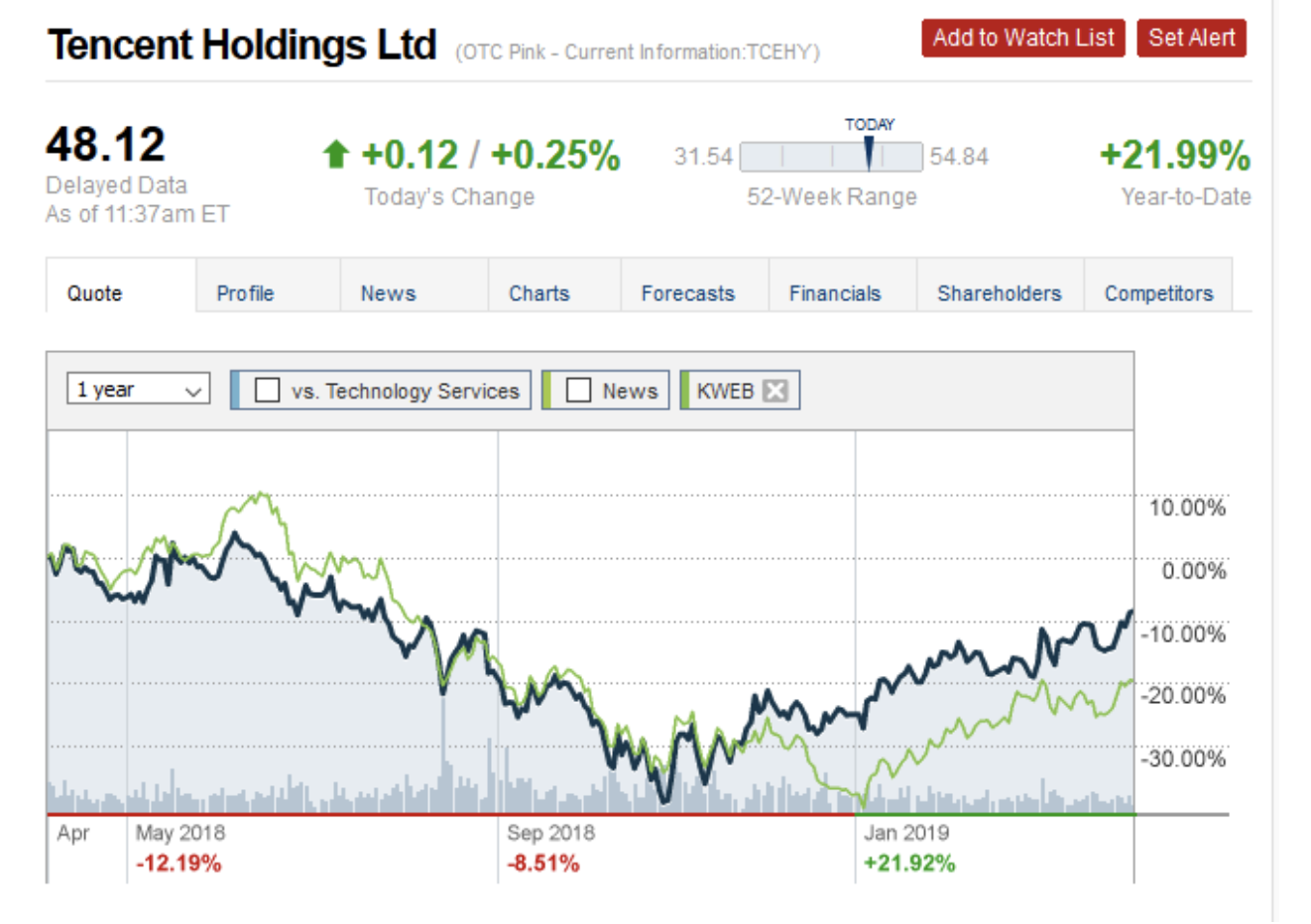China’s social media and gaming heavyweight Tencent Holdings (OTC Pink:TCEHY) said back in February that it had no plans to scale back on investments after a record 16 companies it had invested in went public last year. It’s definitely put its money where its mouth is, with company president Martin Lau saying that Tencent has invested in more than 700 companies over the past decade--of which 63 are now listed and 122 are valued at more than a billion each.
But now, the tech giant is taking things one giant step further … It’s paying a visit to the capital markets.
Tencent has completed a huge $6-billion bond sale, and the proceeds are earmarked for refinancing and general corporate purposes. The bonds are of varying maturities with $3 billion being 10-year notes; $2 billion are five-year notes while the rest is split equally between 7-and 30-year notes.
Refinitiv data has revealed that the bond sale is the largest on the Asian continent so far this year and more than twice as large as the previous record set by property developer China Evergrande Group’s $2.8-billion January issue. The interest rates are reasonable, too, ranging from coupons of 3.280 percent for the five-year notes at the low end to 4.525 percent for the 30-year bonds at the high end.
Related: Positive Economic Data Weighs On Gold
Tencent joins a group of Asian tech firms that are participating in the Asian debt rush as their market values continue to swell.
The successful sale is a big vote of confidence in a company that found itself deep in the doldrums for much of last year. TCEHY shares have managed a healthy year-to-date return of 22 percent though they have underperformed the Chinese benchmark, KraneShares CSI China Internet ETF (KWEB) which is boasting a 29.5 percent gain over the period. Tencent, Alibaba Group (NYSE:BABA) and Baidu Inc. (NASDAQ:BIDU) in that order are the biggest weightings in the ETF.

(Click to enlarge)
Source: CNN Money
Tencent last tapped the bond market in January 2018 after it issued $5 billion worth of bonds. On Monday, the company flagged that it had doubled its global bond authorization from $10 billion to $20 billion even as interest rates across most markets remain low.
Investors can therefore expect to see the company visit the debt market a couple more times before it can reach that limit. They need not worry, though, since the company’s debt-to-equity ratio of 0.6, though higher than the 10-year median of 0.43, still compares favorably with the industry average.
Tencent shares were nearly cut in half last year, tumbling from their all-time high after China’s gaming regulator put a nine-month freeze on new game approvals thus denying the company a chance to monetize popular titles including ”PlayerUnknown’s Battlegrounds” and “Honor of Kings.” The ban was only lifted in December.
Tencent is actually more of a conglomerate rather than a pure-play gaming company like GameStop Inc. (NYSE:GME) or a social media player like Facebook Inc.(NYSE:FB). The company also owns a string of high-profile investments including Tesla Inc. (NASDAQ:TSLA), Spotify Technology (NYSE:SPOT), Snapchat Inc. (NYSE:SNAP) and Hollywood film and TV. Gaming is a big part of the company, and last year’s hiatus resulted in a 35 percent Y/Y decline in profits, the worst showing by the company ever since it went public.
Tencent’s massive investments have, luckily, kept it in good stead. The company managed to quickly return to profit growth during the final quarter of the year thanks in large part to its investment in Meituan, a food-delivery startup that went public last year in a $4 billion IPO.
Chinese stocks doing well
The fact that Chinese shares have overall been doing so well in the current year in the midst of one of the worst trade wars in recent history is perhaps baffling for some investors. Indeed, trade tensions were to blame for the poor performance of the shares during much of 2018.
Nevertheless, the mood has improved quite a lot this year.
Related: SEC Releases New Token Sale Guidelines
Bloomberg has reported that a trade war truce is now in sight with presidents Trump and Liu scheduled to meet. A few days ago, data from the country showed that manufacturing activity had experienced an uptick during the month of March to reach a six-month high PMI (Purchasing Managers Index) reading of 50.5.
Further, the constant stream of negative news has tended to overshadow the continued growth of China’s retail sales and services sector not to mention its rapidly growing capital markets.
On Monday, Bloomberg kicked off the process of adding hundreds of Chinese bonds to its portfolio thus expanding the universe of publicly traded Chinese assets.
While the systemic risks associated with investing in China including deteriorating credit risks and high state involvement in the equities market still remain, the Asian nation is undoubtedly becoming a more investable space than it was a few years back.
By Alex Kimani for Safehaven.com
















